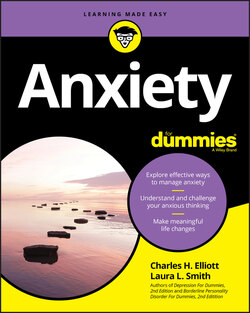Читать книгу Anxiety For Dummies - W. Doyle Gentry, Laura L. Smith - Страница 36
Beyond everyday anxiety
ОглавлениеOf course, everyone feels a little panicked from time to time. People often say they feel panicked about an upcoming deadline, an impending presentation, or planning for a party. You’re likely to hear the term used to describe concerns about rather mundane events such as these.
But people who suffer with panic are talking about entirely different phenomena. They have periods of stunningly intense fear and anxiety. If you’ve never had a panic attack, trust us, you don’t want one. The attacks usually last about ten minutes, and many people who have them fully believe that they will die during the attack. Not exactly the best ten minutes of their lives. Panic attacks normally include a range of robust, attention-grabbing symptoms, such as
An irregular, rapid, or pounding heartbeat
Perspiring
A sense of choking, suffocation, or shortness of breath
Vertigo or lightheadedness
Pain or other discomfort in the chest
A feeling that events are unreal or a sense of detachment
Numbness or tingling
Hot or cold flashes
A fear of impending death, though without basis in fact
Stomach nausea or upset
Thoughts of going insane or completely losing control
Panic attacks begin with an event that triggers some kind of sensation, such as physical exertion or normal variations in physiological reactions. This triggering event induces physiological responses, such as increased levels of adrenaline. No problem so far.
But the otherwise normal process goes awry at the next step — when the person who suffers from panic attacks misinterprets the meaning of the physical symptoms. Rather than viewing the physical symptoms as normal, the person with panic disorder sees them as a signal that something dangerous is happening, such as a heart attack or stroke. That interpretation causes escalating fear and thus more physical arousal. Fortunately, the body can sustain such heightened physical responses only for a while, so it eventually calms down.
Professionals say that in order to have a formal diagnosis of panic disorder, panic attacks must occur more than once. People with panic disorder worry about when the next panic attack will come and whether they’ll lose control. They often start changing their lives by avoiding certain places or activities.
The good news: Many people have a single panic attack and never have another one. So, don’t panic if you have a panic attack. Maria’s story is a good example of a one-time panic attack.
Maria resolves to lose 20 pounds by exercising and watching what she eats. On her third visit to the gym, she sets the treadmill to a level six with a steep incline. Almost immediately, her heart rate accelerates. Alarmed, she decreases the level to three. She starts taking rapid, shallow breaths but feels she can’t get enough air. Sweating profusely and feeling nauseous, she stops the machine and staggers to the locker room. She sits down; the symptoms intensify, and her chest tightens. She wants to scream but can’t get enough air. She’s sure that she’ll pass out and hopes someone will find her before she dies of a heart attack. She hears someone and weakly calls for help. An ambulance whisks her to a nearby emergency room.
At the ER, Maria’s symptoms subside, and the doctor explains the results of her examination. He says that she has apparently experienced a panic attack and inquires about what may have set it off. She answers that she was exercising because of concerns about her weight and health.“Ah, that explains it,” the doctor reassures. “Your concerns about health made you hypersensitive to any bodily symptom. When your heart rate naturally increased on the treadmill, you became alarmed. That fear caused your body to produce more adrenaline, which in turn created more symptoms. The more symptoms you had, the more your fear and adrenaline increased. Knowing how this works may help you; hopefully, in the future, your body’s normal physical variations won’t frighten you. Your heart’s in great shape. Go back to exercising.“Also, you might try some simple relaxation techniques; I’ll have the nurse come in and tell you about those. I have every reason to believe that you won’t have another episode like this one.”
Maria had one panic attack and may never experience another one. If she believes the doctor and takes his advice, the next time her heart races, she probably won’t get so scared. She may decide to see how things go before seeking treatment for her problem. However, if she has a recurrence, treatment works pretty well for this issue.
